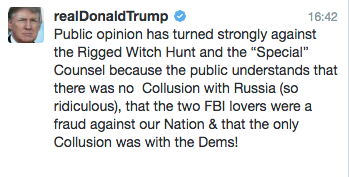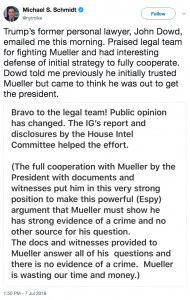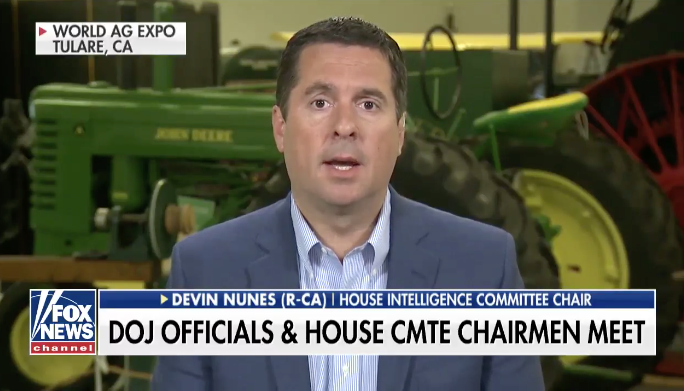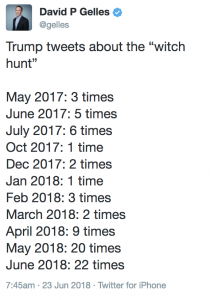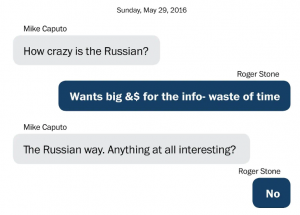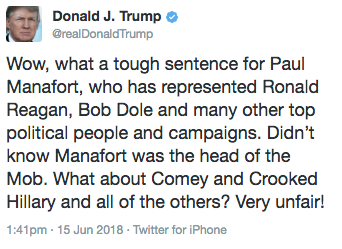The Non-EDVA Manafort Thread: Paulie Continues to Work for His Pardon
Today, a bunch of stalwart journalists are fighting the back-asswards conditions in Alexandria’s courthouse to bring breaking news from the first day of Paul Manafort’s tax evasion trial. In this post, I’m going to look at a few details that have happened outside of the courthouse
Yesterday, The Daily Beast provided some kind of an explanation for Rudy Giuliani’s weird TV meltdown yesterday. It turns out Rudy was (successfully) pre-empting a NYT story.
The day began with a morning interview with Fox & Friends, during which Giuliani insisted that “collusion [with Russian election-meddlers] is not a crime” in the first place. He then headed to CNN where he proceeded to, ostensibly, break a bit of news about the infamous Trump Tower meeting that the president’s son took with a Russian lawyer reportedly tied to Kremlin officials.
Two days before that meeting, Giuliani relayed, former Trump attorney and fixer Michael Cohen claimed that there was a separate meeting; this one, involving five people, including Cohen himself. According to Giuliani, three of the five people in that supposed meeting told him “it didn’t take place.” Not only that, they had done so “under oath on it and the other two couldn’t possibly reveal it because [Special Counsel Robert] Mueller never asked us about it.”
“You get to the other meeting he says he was at, that the president wasn’t at…with Donald [Trump] Jr., Jared [Kushner], [Paul] Manafort…[Rick] Gates and one other person. Cohen also now says that—he says too much—that two days before he was participating in a meeting with roughly the same group of people—but not the president, definitely not the president—in which they were talking about the strategy of the meeting with the Russians,” Giuliani continued. “The people in that meeting deny it, the people who we’ve been able to interview. The people we’ve not been able to interview have never said that about that meeting.”
[snip]
In subsequent interviews on Monday, the president’s lawyer claimed that, in fact, he was only speaking off of as-yet unverified details from reporters who had contacted Team Trump to ask about the planning meeting.
Giuliani told The Daily Beast that this included reporters from The New York Times, such as the paper’s star Trump reporter Maggie Haberman, who had reached out about the alleged pre-meeting meeting. So, he added, “Jay [Sekulow] and I spent a great deal of [Sunday] trying to run it down.”
Giuliani said that he believes they managed to “shut it down” and help kill the story, and speculated the journalists had also found other reasons not to run the item. Giuliani and Sekulow—according to Giuliani—had to “go to [alleged participants’] lawyers, and they had to go back to their notes, because nowadays no one wants to be inaccurate”—a rather ironic statement.
As others have noted, this explanation may be most interesting for the glimpse it offers on the Joint Defense Agreement, in which Rudy can call up other potential defendants’ lawyers and agree on a story. And, after consulting with these other lawyers, Rudy appears to claim the following:
- At a June 7 meeting attended by Jr, Jared, Manafort, Gates, one other person, and Cohen, strategizing the Russian meeting did not come up.
- At another meeting, reportedly including the President and four of the six who attended the June 7 meeting, he was not told about the Russian meeting.
Also, collusion is not a crime because only hacking is.
Rudy provides us some clues here. Rudy’s says that three of five people in the meeting including Trump told Mueller it didn’t happen and the other two weren’t asked about it by Mueller. Those other two must be Don and his spawn, because they haven’t been interviewed by Mueller. But if that’s the case, the math actually works out to just two people telling Mueller it didn’t happen, because Cohen also hasn’t been interviewed. There’s a 66% chance that Manafort and Gates are the ones who told Mueller it didn’t happen.
Then there’s the June 7 meeting — a meeting on the same day that Manafort also had a meeting with Trump, and the day that Trump promised a report on Hillary in the upcoming days (so a day when the campaign would have been strategizing a Hillary attack of one sort or another). Rudy suggests that meeting was attended by someone or someones who they haven’t been able to interview, but who nevertheless have never said anything about strategizing the Russia meeting. Perhaps this is just a reference to Cohen, a way of claiming he never said this before. Or perhaps there’s someone else who’s not part of the JDA.
Notice how this story, thus far, relies on Junior (who has not been interviewed and clearly is a target) and Gates (who has subsequently flipped) and Manafort (whose first trial just started)?
Given the centrality of Manafort in this story — and Trump’s prior admission that Manafort could incriminate him — I’m particularly interested in this other bit from Rudy, suggesting the possibility that Manafort has flipped and “lied.” (h/t CH)
They’re putting Manafort in solitary confinement — which sounds more like Russian than the US — in order to get him to break. And maybe they’ve succeeded in cracking this guy, and getting him to lie. I don’t know. I’m not sure of that.
So Cohen may (or may not) be blabbing about stories that greatly incriminate Trump. To rebut them, his lawyer is taking to the cable shows to reveal multiple previously undisclosed meetings, and assuring the public that those who either were or maybe just the people who remain in a JDA with the President say it didn’t happen. Which leaves Gates, who has flipped, and Manafort, whom Rudy is obviously worried might flip.
Meanwhile, as he was heading into his client’s trial this morning, Manafort lawyer Kevin Downing apparently said there was “no chance” his client would flip to avoid trial. From whence Downing proceeded to go spend much of his opening argument blaming Gates for Manafort’s epic corruption. Here’s HuffPo.
An attorney for former Trump campaign manager Paul Manafort told jurors during opening arguments in his tax and bank fraud trial on Tuesday that Manafort’s longtime aide Rick Gates ― now a witness for special counsel Robert Mueller ― is a liar who can’t be trusted.
Manafort, attorney Tom Zehnle told jurors, made a mistake in “placing his trust in the wrong person” who was now willing to say anything to keep himself out of trouble. Zehnle told jurors that Manafort “rendered a valuable service to our system of government” because of his involvement in multiple presidential campaigns.
And here’s Reuters.
“Rick Gates had his hand in the cookie jar,” defense attorney Thomas Zehnle said in opening statements at Manafort’s trial in federal court in Virginia. “Little did Paul know that Rick was lining his own pockets.”
Meanwhile, several developments in Manafort’s cases happened outside the courtroom. First, he dropped his challenge to Mueller’s authority in the DC Circuit. The DC Circuit denied his bid to get out of jail during this and while awaiting his DC trial, based primarily on the additional witness tampering charges that followed Amy Berman Jackson’s warnings about violating her gag order.
Most interesting however, was this exchange. Last night, Manafort asked for a 25-day delay in a pre-trial report he has to submit jointly with the prosecution in his DC case, citing his ongoing EDVA trial. But as the scathing response made clear, he brought that on himself when he refused to waive venue for these tax charges and instead took his chances with two trials.
[T]he Court’s August 1, 2018, deadline is no surprise; it has been in place for five months, when this Court entered its Scheduling Order on March 1, 2018. (Doc. 217). Nor was it a surprise that Manafort (like the government) would need to prepare for two trials when Manafort elected to have two trials. Indeed, this Court advised the defense that the defendant’s choice to have two trials might well result in “a trial in the Eastern District of Virginia before this one. So you may want to keep that in mind.”
More interesting, the Mueller team described how Manafort has spent the last two weeks accepting details of the government’s plan in the DC case, without reciprocating or warning them he was going to ask for a delay.
[T]he government spent the last two weeks making disclosures to Manafort of all of the different components required by the joint pretrial statement. The government furnished to the defense: (a) a proposed joint statement of the case; (b) an estimate of the length of the government’s case-in-chief; (c) proposed jury instructions; (d) a notice of intended expert witnesses; (e) an exhibit list; (f) all proposed stipulations; (g) a proposed special jury instruction (in lieu of a list of matters for the Court to take judicial notice); and (h) a proposed verdict form.1 Notably, the government identified a list of hundreds of exhibits—with Bates numbers and descriptions—it intends to use at trial, giving the defense a roadmap of its case. With each submission to the defense, the government asked the defense to alert it to its position, so the government could inform the Court in the joint statement due on August 1, 2018. Not once did Manafort respond, in any way, to any of the government’s disclosures. Similarly, the defense produced no reciprocal materials to the government.
When Manafort dropped his challenge to Mueller’s authority, some wondered whether that was a sign he’s about to flip. But this ploy with the DC schedule makes it clear he continues to do what he has been doing from the start: using his trials as an effort to discredit Mueller as much as possible, while obtaining as much information about the case in chief — the conspiracy with Russia.
As I’ve said repeatedly, that seems to be the terms of his pardon deal with Trump: he spends his time discrediting the Russian conspiracy case, and in the future, Trump may reward him in kind.
Given that Gates may actually have already told Mueller about the meetings Rudy is trying to deny, I expect more attacks in Rick Gates in the coming weeks, then.



